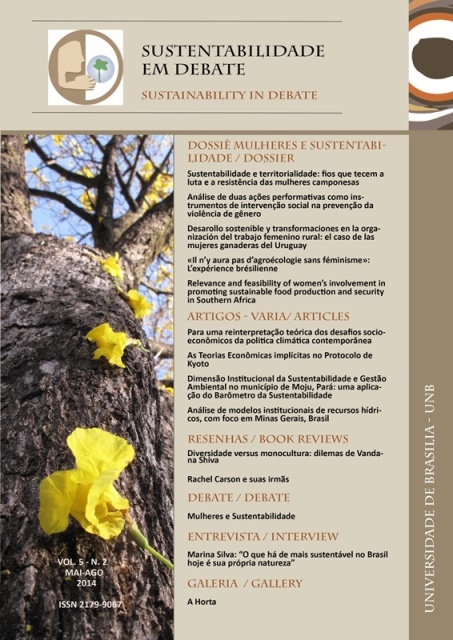Sustainability and Territoriality:
Crafting the Fight and the Resistance of Rural Women in Brazil
DOI:
https://doi.org/10.18472/SustDeb.v5n2.2014.10878Keywords:
Sustentabilidade, Assentamento Rural, Mulher rendeiraAbstract
The article is outlined from the analysis of a case study research realized in the context of actions
of women in the Maceió settlement, located in the county of Itapipoca, in the state of Ceará.
Working with social relations and reproduction strategies of the lace-making and peasant women,
the sustainability and territoriality categories are being operated for the comprehension of their
practices and their world views. Collectively organized, they produce a material and mainly
symbolic value, by relating their handicraft work to the territoriality and the socio-environmental
sustainability of the settlement. Through their forms of inclusion into the spaces of power and
production, they constitute new identities, promote the participation and the
selfacknowledgment in the use and occupation of the beach and the sea, in the organization of
the settlement, in the groups of extraction and beneficiation of seaweed and in the struggles
involving the construction of territorialities.
Downloads
References
solidária: a alavanca para um desenvolvimento sustentável e solidário. São Paulo:
Fundação Perseu Abramo, 2006.
GUZMÁN, Eduardo Sevilla. Agroecologia e desenvolvimento rural sustentável. In:
AQUINO, Adriana Maria de; ASSIS, Renato Linhares de. Agroecologia: princípios e
técnicas para uma agricultura orgânica sustentável. Brasília, DF: Embrapa, 2005, p.
103-132.
HAESBAERT, R. O mito da desterritorialização: do “fim dos territórios” Ã
multiterritorialidade. 3. ed. Rio de Janeiro: Bertrand Brasil, 2011.
LEFF, Enrique. Complexidade, interdisciplinaridade e saber ambiental. In: PHILIPP
JR., Arlindo. TUCCI, C. E. M. HOGAN, R. Navegantes. Interdisciplinaridade em
Ciências Ambientais. São Paulo: Signus, 2000. p. 19-51.
______. Racionalidade Ambiental: a reapropriacão social da natureza. Rio de
Janeiro: Civilização Brasileira, 2006.
______. Epistemologia Ambiental. 4. ed. São Paulo: Cortez, 2007.
NEVES, Delma Pessanha; MEDEIROS, Leonilde Servolo de (Orgs). Mulheres
Camponesas. Trabalho produtivo e engajamentos políticos. Niterói: Alternativa,
2013.
PECQUEUR, Bernard. O desenvolvimento territorial: uma nova abordagem dos
processos de desenvolvimento para as economias do Sul. RAÍZES ”“ Revista de
Ciências Sociais e Econômicas. v. 24, n. 1 e 2, jan-dez. Campina Grande: UFCG/
PPGS, 2005. p. 10-22.
PELBART, Peter Pál. Império e biopotência. In: PELBART, Peter Pál. Vida capital:
ensaios de biopolítica. São Paulo: Iluminuras, 2003. p. 81-89.
SANTOS, Milton. Economia espacial: críticas e alternativas. 2. ed. São Paulo: EDUSP,
2007.
WOORTMANN, Ellen F. Da complementaridade à dependência: a mulher e o
ambiente em comunidades “pesqueiras” do Nordeste. Brasília, 1991. Série
Antropologia. p. 111-145.
Downloads
Published
How to Cite
Issue
Section
License
SUSTAINABILITY IN DEBATE – Copyright Statement
The submission of original scientific work(s) by the authors, as the copyright holders of the text(s) sent to the journal, under the terms of Law 9.610/98, implies in the concession of copyrights of printed and/or digital publication to the Sustainability in Debate Journal of the article(s) approved for publication purposes, in a single issue of the journal. Furthermore, approved scientific work(s) will be released without any charge, or any kind of copyright reimbursement, through the journal’s website, for reading, printing and/or downloading of the text file, from the date of acceptance for publication purposes. Therefore, the authors, when submitting the article (s) to the journal, and gratuitous assignment of copyrights related to the submitted scientific work, are fully aware that they will not be remunerated for the publication of the article(s) in the journal.
The Sustainability in Debate Journal is licensed under Creative Commons License – Non-Commercial-No-Derivation Attribution (Derivative Work Ban) 3.0 Brazil, aiming at dissemination of scientific knowledge, as indicated on the journal's website, which allows the text to be shared, and be recognized in regards to its authorship and original publication in this journal.
Authors are allowed to sign additional contracts separately, for non-exclusive distribution of the works published in the Sustainability in Debate Journal (for example, in a book chapter), provided that it is expressed the texts were originally published in this journal. Authors are allowed and encouraged to publish and distribute their text online, following publication in Sustainability in Debate (e.g. in institutional repositories or their personal pages). The authors expressly agree to the terms of this Copyright Statement, which will be applied following the submission and publishing by this journal.






